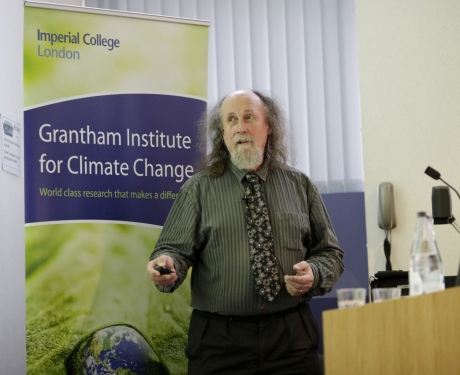Understanding the impacts of climate change on the biosphere

A workshop to understand impacts and risks of climate variability and change on terrestrial ecosystems was held at Imperial College London.
The workshop was chaired by Professor Iain Colin Prentice to mark the start of his new position as Chair in Biosphere and Climate Impacts in the Department of Life Sciences and the Grantham Institute for Climate Change.
The position has been awarded by the AXA Research Fund, a world-wide initiative of scientific philanthropy supported by the global insurance group AXA.
The workshop, held on 24 and 25 June, brought together leading climate scientists and ecosystems researchers to discuss the major risks to terrestrial ecosystems from a changing climate.
Discussion ranged from food security to the role of land and ocean feedbacks on atmospheric carbon dioxide.
A full report from the workshop can be downloaded here.
Professor Colin Prentice also delivered a public lecture on the evening of the 24 June, entitled ‘State of ignorance: climate change and the biosphere’.
You can watch a video of the lecture here.

The future of Agriculture in a changing world
- Climate change will have profound direct impacts on agriculture, and this will exasperate other drivers of food security.
- There is a need to protect against food price spikes which can occur when weather causes poor harvests.
- New institutional arrangements, new policies and new investment are needed to tackle the problem of food security.
Biodiversity conservation in a changing climate
- Changes in temperature are causing species to shift their natural ranges; however those that are unable to move in line with changing temperatures are being put at risk.
- The solution of assisted colonization was proposed, where a species is introduced to a new more suitable habitat.
- The benefits to the species need to be balanced with the potential risks to the community it is being introduced to.
Climate change and water resources
- There are many uncertainties in climate and hydrological models and these should be seen as tools for giving plausible scenarios rather than predictions.
- In order to better understand the processes involved, the modelling community needs to understand why the models are different rather than just looking at the distribution in their results.
Biogeochemical feedbacks and atmospheric carbon dioxide
- Feedbacks from the land and ocean have an impact on levels of carbon dioxide in the atmosphere.
- Some feedbacks, such as those due to wildfires are not included in current Earth Systems Models and these may have significance in the carbon uptake of the land.
- There are still also uncertainties in representing carbon dioxide fertilisation and the nitrogen cycle in Earth Systems Models.
Article text (excluding photos or graphics) © Imperial College London.
Photos and graphics subject to third party copyright used with permission or © Imperial College London.
Reporter
Press Office
Communications and Public Affairs
- Email: press.office@imperial.ac.uk
